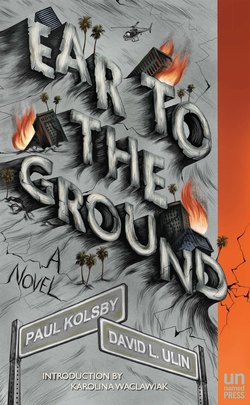Читать книгу Ear to the Ground - David L. Ulin - Страница 11
На сайте Литреса книга снята с продажи.
ОглавлениеTHE GIRL NEXT DOOR
CHARLIE KEPT THINKING ABOUT THE GIRL NEXT DOOR. Ever since the night he’d heard her, like a Santa Ana wind through the bedroom wall, he had found her entering his mind at odd moments: in the supermarket, for instance, or while staring at a computer screen. He wasn’t obsessed—he had never even seen her, for Christ’s sake—just a little, well, curious, if that was still something people felt in this day and age, where everything was up for grabs and yours for the taking, if only you knew better than to ask.
This morning, as he left his apartment, checking to make sure he had turned both locks, Charlie glanced across the landing at her door. The day was silent, the sun as white as movie light.
On the sidewalk, Navaro dragged a dirty rag soaked in sudsy water across the hood of his Le Sabre.
“So tell me,” he asked Charlie. “You renting that thing by the week?”
“Pardon?”
“The car.” Navaro nodded at the red Corsica parked across the street. When Charlie didn’t answer, the landlord straightened up and wrung his rag out on the ground. “Never mind. You meet Grace yet?”
“Pardon?” Charlie felt like he was missing something, like he didn’t understood the words.
“Grace.” Navaro looked at him though hooded eyes. “She lives next door to you.”
“Grace?”
Navaro laughed and kicked his right front tire.
The Center for Earthquake Studies occupied a former sound stage on Culver Boulevard just west of Overland, catty-corner to the Sony Pictures Studios. Big and boxy and windowless, the building was painted a stucco shade of tan.
Inside, an arched ceiling hung above the space like a dome of sky, reminding Charlie of a beehive. He nodded hello to a couple of faces he thought he recognized, and moved quickly across the room to a locked, unmarked door.
It was always the same in the Prediction Laboratory, a subtle shade of twilight, quiet beneath the ever-present electrical hum. With its computer models and maps marked with pushpins tracing earthquake activity, the lab reminded Charlie of a command center, more military than scientific. Kenwood was already at his desk, staring at the wall above it as if deep in thought. Charlie didn’t want to disturb him, but then he realized Kenwood wasn’t working, just looking at a picture of a dark-haired woman. “You should really take it down,” Charlie said, his voice as even as the wind.
Kenwood didn’t move. His face looked normal, except for the mouth, cut into an exaggerated mask. “You know what the thing of it is?” he whispered. “I keep thinking that in twenty years, she’ll just be someone I loved when I was young. I won’t even remember her. She’ll be obsolete.”
“People die,” Charlie said.
“We were married one year.”
“It’s not your fault.”
“What’s not his fault?” Charlie turned to see Sterling Caruthers standing in the door. Caruthers was the only other person with a key to the lab, and he made it a habit to show up unannounced, peering through microscopes and at computer screens as if he knew what he was looking for.
“Nothing,” Charlie said.
“What did he do?”
“It’s personal, OK?”
“What did you do?” Caruthers folded his arms across his chest and glared at Kenwood.
“We were just talking,” Charlie told him.
“You should be working. What about Indio?”
“Indio was nothing.”
“There were two temblors less than a mile apart.”
“Tremors like that happen all the time out there.”
“Listen,” Caruthers said, “if you don’t think Caltech’s getting ready to make a prediction of its own …”
“Sterling,” Charlie said again, “those quakes don’t add up to a thing.”
“Then it’s your job to make them add up. We are here to predict an earthquake, gentlemen. Now, if we mark a course from Indio up to L.A. …”
Caruthers sat down at Kenwood’s work station and began to tap at the keyboard. On the screen, a map of Southern California took shape, a latticework of fine green lines. Charlie stared at it for a moment, thinking there was something delicate in its construction, a fragile balance similar to that of the earth itself. Certainly, he thought, there had to be a way to read that balance consistently. But it would take time to find.
Caruthers’s voice droned on and on as he plotted points on the computer, and Charlie stopped listening, hearing it as if through a wall. It was like a sound that came at him from the other apartment. In the last week, there had been lots of noises, and once he thought he’d heard someone in the hall, but it was only a cat scratching at his doormat, looking for a place to get warm. Charlie tried to concentrate on what Caruthers was saying, but he couldn’t stop thinking of the girl next door.
